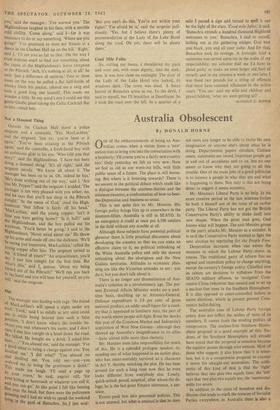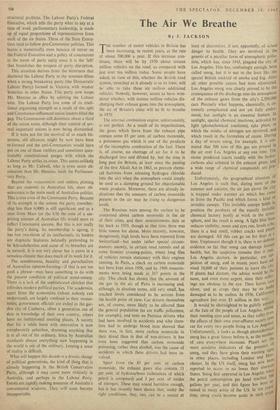Australia Obsolescent
By DONALD HORNE
0 NE of the embarrassments of being an Aus- tralian comes when a visitor from a 'new' nation tries to bring you into the conversation with a brotherly: 'Of course you're a fairly new country too.' Only yesterday we felt so very new. Now we feel as old as our worn-out hills, with little public sense of a future. The place is still boom- ing. But where is it booming towards? There is no answer in the political debate which reads like a dialogue between the nineteen-thirties and the nineteen-twenties, a confrontation of how-to-beat- the-Depression and business-as-usual.
This is not quite fair to Mr. Menzies. His foreign policy brings him up to somewhere in the nineteen-fifties. Australia is still in SEATO. In an emergency it could at once put 4,500 soldiers in the field without any trouble at all.
Although these subjects have potential political glamour there is little practical discussion about developing the country so that we can stake an effective claim to it, no political rethinking of the White Australia policy and only the slowest rethinking about the aborigines and the New Guinea territories, Attitudes to economic plan- ning are like the Victorian attitudes to sex : you do it, but you don't talk about it.
There is no longer any dramatisation of Aus- tralia's isolation in a revolutionary age. The pre- sent External Affairs Minister works on a part- time basis, doubling up as Attorney-General. Defence expenditure is 2.8 per cent. of gross national product, an oddly small figure far a coun- try that is appended to Southern Asia, the part of the world where people still fight. Even the shocks this year of the Common Market and Indonesia's acquisition of West New Guinea—although they showed up Australia's insignificance to its allies —have stirred little more than rhetoric.
Mr. Menzies must take responsibility for much of this. He is a splendid prologue speaker, re- minding one of what happened in an earlier play, who has unaccountably survived as a character in Act V, thereby wrecking the plot. He has been around for such a long time now that he even looks different from everybody else. Lonely, quick-witted, proud, sceptical, after whom the de- luge, he is the last great Empire statesman, a sur- vivor.
Events push him into piecemeal policies. This is not unusual, but what is unusual is that he does not seem any longer to be able to excite his own imagination or anyone else's about what he is doing. Departmental papers circulate, Cabinet meets, statements are issued, important people get in and out of aeroplanes and so on, but no one seems to know why they are going to all this trouble. One of the main jobs of a good politician is to interest a people in who they are and what is happening to them. Not only is this not being done; to suggest it seems eccentric.
Mr. Menzies's Liberal Party is no help. In his more creative period in the late nineteen-forties he built it himself out of the ruins of an earlier party. The Liberal Party has not got the British Conservative Party's ability to shake itself into new shapes. When the great man goes, God knows what will happen. The anti-Menzies group in the party attacks Mr. Menzies as a socialist. It is as if the Conservative Party wanted to fight the next election by reprinting Set the People Free.
Desperation increases when one enters the museum in which the Labour Party stores its totems. The traditional party of reform has no agreed and immediate policy to change anything, except the country's foreign policy. Chiselled into its tablets are decisions to withdraw from the SEATO military alliance, to 'recognise' Com- munist China (whatever that means) and to set up a nuclear-free zone in the Southern Hemisphere. It is also opposed to court-controlled ballots in union elections, which at present prevent Com- munist ballot-faking.
The neutralist tone of Labour Party foreign policy does not reflect the wishes of most of its members. It comes from the eroding politics of compromise. The nuclear-free Southern Hemis- phere proposal is a good example of this. Stu- dents of the Southern Hemisphere will already have noted that the proposal is senseless because the equator passes through nine nations. Most of those who support it also know that it is sense- less, but it is a compromise proposal to counter a move for straight-out neutralism. The arith- metic of this kind of deal is that the 'right' believes that two plus two equals four; the 'left' says that two plus two equals ten; the 'moderates' settle for seven.
In addition to the crisis of boredom and dis- , illusion that tends to mark the remains of Socialist Parties everywhere, in Australia there is also a structural problem. The Labour Party's Federal Executive, which tells the party what to say at a time of weak parliamentary leadership, is made up of equal proportions of representatives from each of the six States. Three of the State Execu- tives tend to follow pro-Communist policies. This leaves a numerically even balance of terror on the Federal Executive and a policy of concessions in the name of party unity since it is the 'left' that brandishes the weapon of party disruption.
This situation derives from the bitterness that shattered the Labour Party in the nineteen-fifties when a strong breakaway party (the Democratic Labour 'Party) formed in Victoria with weaker branches in other States. This party now keeps Mr. Menzies il3 office by splitting the Labour vote. The Labour Party lost some of its tradi- tional organising strength as a result of this split and Communist-influenced union leaders filled the gap. The Communists still dominate about a third of the union votes, although their control of sev- eral important unions is now being dismantled.
If it were not for the survival of so much bit- terness, old alliances might by now have been re-formed and the anti-Communists would have put on one of those ruthless and sometimes ques- tionably constitutional purges with which the Labour Party settles its crises, This seems unlikely as long as Mr. Calwell, who is even more ob- solescent than Mr. Menzies, leads the Parliamen- tary Party.
Beyond the ressenriment and endless plotting that are endemic to Australian life, sheer ob- solescence is the main mark of Australian politics. This is true even of the Communist Party. Because of its strength in the unions the party (member- ship less than 6,000) is still significant and to a man from Mars (or the US) the tone of a sur- prising amount of Australian life would seem to reflect Communist success, But this is not really the party's doing. Its membership is ageing, it has lost two-thirds of its intellectuals, its leaders are dogmatic Stalinists belatedly pretending to be Khrushchevites and some of its branches are in turmoil. It is not very clever but it exists in a senseless climate that does much of its work for it.
The senselessness, banality and parochialism of Australian opinion-forming—if that is not too posh a phrase—may have something to do with the present condition of political stand-uneasy. There is a lack of the sophisticated chitchat that refreshes modern political parties. The academics, apart from the economists (whom nobody can understand), are largely confined to their monas- teries; government officials are exiled in the gar- den city of Canberra, often a generation out of date in knowledge of their own country; others have no institutional meeting places. A society that for a while burst with innovation is now complacently suburban, shunning anything that is at all out of the ordinary. Since by Australian
standards almost everything now happening in the world is out of the ordinary, keeping a sense of reality is difficult.
What will happen this decade is a drastic change of political generations, the kind of thing that is already happening in the British Conservative Party, although it may come more violently in Australia, and perhaps in the Labour Party. Events arc rapidly making nonsense of Australia's conventional wisdoms. They will soon become insupportable.































 Previous page
Previous page